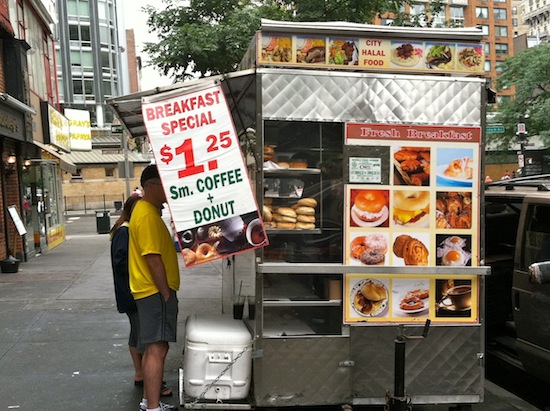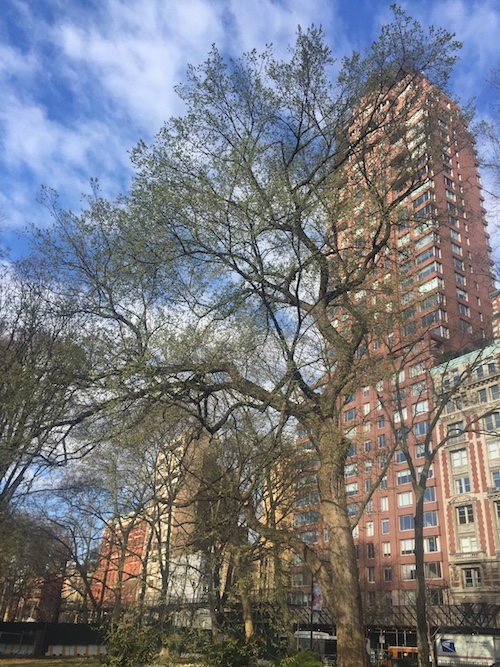By Michael McDowell
Will the Upper West Side be one day filled with vegan taco trucks, momo carts, or Thai on wheels?
It’s possible, if legislation scheduled for a Committee on Consumer Affairs and Business Licensing hearing Thursday morning continues to make its way through City Council to Mayor Bill de Blasio.
The proposed legislation would, over the next decade, gradually expand the number of permits for street vending and dismantle the black market on which such permits are currently leased. It would also create a centralized, interagency Office of Street Vendor Enforcement, to be operational by September 1, 2019, which would “exclusively enforce vending laws.” It would additionally establish a Street Vendor Advisory Board composed of “vendors, brick and mortar small businesses, representatives from community groups, labor unions, property owners, and city agencies.”
Council Member Mark Levine, who is a sponsor of the bill, called it a “win-win,” in an interview with the Rag.
“Street vending has been a cherished path to economic opportunity in this city for centuries, and it remains an important part of New York’s character and our street life. Street vendors, like everybody else, have to obey the rules, and we’ve never really had consistent enforcement. We’ve also had a problem of a huge illegal market in permits. This legislation would address both issues,” he said.
The new rules would be good for the city, Levine affirmed.
“Look, I would be malnourished if it weren’t for the street vendors of New York City. When you lead a busy schedule like me, they are lifesavers. So I have a personal stake in making sure that they remain part of the culinary options of this city,” he concluded.
Council Member Helen Rosenthal is not a sponsor.
“We are studying the bill very carefully—especially with an eye to any impacts on Upper West Side residents—and will have more to say shortly,” a spokeswoman told the Rag.
Roberta Semer, Chair of Community Board 7, explained to the Rag that while the board has no official position, it is closely following this legislation, and hopes community boards will have more input as to vendor placement if more permits are to become available.
In addition to community board input, Semer is sensitive to street clutter, and concerned about the impact the presence of additional vendors could have on already struggling local businesses. However, “we are certainly not opposed to [the bill],” she emphasized.
Mohamed Attia, Co-Director of the Street Vendor Project at the Urban Justice Center, disputed the suggestion that street vendors compete with brick and mortar.
“There is no evidence, in any neighborhood nationwide, that when vendors move in they take away business from brick and mortar [businesses]. In fact, many studies have found that the opposite happens, and here in New York City, neighborhoods have lost a lot of business when the vendors go away,” he told the Rag. On the other hand, “when vendors go to a new neighborhood, the neighborhood becomes more vital and more exciting—it improves the neighborhood.”
There are three distinct varieties of street vendor: food vendors, merchandise vendors, and First Amendment vendors, who sell protected categories of goods including books, artwork, and newspapers. Food vendors must obtain two types of permits: a food vendor license, and a permit for the unit from which they are selling: a cart or a truck (merchandise vendors need only a general vendor license).
“There has been no increase in permits for food vending, which the city capped at 3,000 in 1983. This has led to the creation of a black market for these permits, which have been held by some people for many years—people who live in different countries, in Egypt and Greece, for example, and still hold onto their permit, because they know it’s worth something. They’ll rent it every two years to real vendors, and it’s a problem, because they are taking advantage of the system and they know that people who need the permit will pay,” Attia said.
How much does it cost to rent such a permit?
“It can be anything from $20-25,000 dollars, and it’s increasing every year,” he said.
At present, Attia estimates that 80-90 percent of food vendors are forced to obtain permits on the underground market.
Upper West Siders who are concerned about block-long tables full of books and other merchandise should note that it is only food vendors who are impacted by the current permit cap. Neither general merchandise vendors nor First Amendment vendors are affected.
“The great thing about this new bill is that the new permits will be attached to the vendor themselves, so nobody can sell them or rent that permit in any other market. [If the bill passes,] it will quickly eliminate the underground market,” Attia said.
Ultimately, it’s a question of how the use of public space is regulated in a city where space is scarce. On the Upper West Side, do we value vegan taco trucks, Citi Bike docks, or clutter-free sidewalks with plenty of space for dogs, strollers, or friends and neighbors with mobility limitations?
Attia makes a convincing case for more of a certain kind of vendor, at least.
“I promise you, once we pass this legislation, you are going to find a momo truck on the Upper West Side and you won’t have to travel to Jackson Heights anymore.”










Street vendors and food trucks are part of what makes living in Manhattan wonderful.
People with mobility issues are usually big supporters of food vendors — they can shop outside on their way around town, which is more convenient than going into store and traversing (sometimes) narrow aisles.
1. Sidewalks are already very crowded – people, sidewalk cafes and existing vendors/carts.
Streets also crowded, no room for more food trucks.
2. Though not permitted, quite a few food vendors discard trash (boxes, food wrap etc) in sidewalk trash bins, contributing to trash overflow.
3, Similarly “eat and run” customers leave massive amounts of trash. Again overflowing trash bins. Rats too.
4. Brick and mortar places are already struggling, especially with high rent charged by greedy landlords.
Food vendors have an unfair advantage.
Sounds good…they should also add assorted fruits to these carts. Enough of this smoking bacteria meats all day long and those sugar peanuts. Lets get healthy!!!! but the NYC health department should be regulating them. Why aren’t they wearing hand gloves ?
Very unsanitary as i can see. I would never eat from them, maybe a water.
These trucks does pollution
Yes! Bring on the food carts! I’m a big fan of the “little guy”, and I also believe they add much energy to our streetscape.
As in the days of Fiorello LaGuardia, I think, like he did, that food carts, trucks, etc., are a source of pollution. They clutter our sidewalks, they emit unpleasant odors, they create more street trash. We do not need more food trucks. In fact, we should not have them at all.
Agreed, thank you.
I really feel for the struggling brick ‘n’ mortar folks, especially the Pakistani restaurants that have been most directly affected by halal carts (I’ve seen a few dearly beloved dives go under for primarily that reason), but my god I’ve had busy weeks over the years where over half my meals were cheap and delicious spicy chicken over rice from one of those carts, though lately I’ve come to prefer the chicken gyros. Those carts are some of the things I miss most when I’m out of town. I do tend to think there are enough carts and trucks already though, not sure how many more the UWS really needs.
As for the person who calls them unsanitary, I disagree — I’ve been food poisoned at Michelin star restaurants but have never once gotten sick in thousands of times ordering from carts. You can see what they’re doing, so they have more incentive to be clean than many a place with a blocked off kitchen!
The 116th street ones by Columbia are some of the best in the city, further south I am partial to the one at 94th and Broadway. Nice guys too!
I’ve never understood how vendors like the one on Columbus and 68th selling vinyl records and books can make a go of it. In all the years I have lived around the corner I have never seen him transacting any business. Maybe it’s the big fat cigar he is always smoking that keeps the customers away. Shouldn’t we proposed to ban that unsanitary practice since the smell is about as offensive as anything I can think of? As for food carts, anything done to disband this vital part of NYC life is selfish and elitist. Trash and not wearing gloves? Oh please. I guess some residents would rather navigate all the dog feces while they avoid patronizing these hard working and often delicious businesses on their way to lulu lemon.
I would welcome Thai on wheels. It’s the noise and noxious fumes from the Mister Softee trucks and the Neopolitan Pizza truck that are major drags.
Killing small restaurants one food car at a time. This is the worst anti small business legislation ever. Combine that with the ever running gas or diesel generators and the filthy sidewalks that are left behind, one has to wonder if the Coty Council thinks of the interest of residents who pay property taxes. Food trucks or carts belong, if they belong anywhere, in tourist areas not residential areas like the upper west side.
Agree with comments that street trucks degrade neighborhoods — unsightly, lots of smoke from grills, trash, smells, generally make beautiful streets look honky-tonk. Then there are the bells and fumes from constantly running Mister Softee trucks.
If people must have street food, designate an area of a commercial district. I don’t want them on my corner or in my community.
And don’t we already have enough empty storefronts? Are we TRYING to put restaurants and stores out of businesses?
Does anyone think that food trucks lead to both sidewalk and street congestion? I would rather see loading zones for large trucks delivering goods to stores, which are becoming fewer and fewer. As for the sidewalk vendors, I find it really problematic to navigate through crowds already. Do we need to have more sidewalk congestion? walking on parts of Broadway is often impossible.
We should be supporting these small businesses. Especially in areas of the City that are becoming more expensive. Vendors provide us with affordable food. As for restaurants and stores, I hope the City supports them as well by figuring out how to stop the skyrocketing commercial rent, which is the real culprit!
Please get rid of the ice cream trucks. They usually park so their butts are into the intersections. So we get to breathe in whatever while waiting for lights or crossing the streets. Every summer there are more and more. We don’t really need more pollution just so people can make money feeding junk to kids. If they want to ban soda in schools, why not ban ice cream in streets. If you want ice cream, go to a store.
Excited for this! One thing I have always loved about sidewalks in New York is the life, the activity, the innovation from small business owners. Would love UWS to be a testing ground. Especially as a tiny woman at night, I also appreciate having the eyes on the street that vendors provide
More food carts = more empty stores (closed restaurants).
No one has noted the historic validity of street vendors. Since the 18th century many immigrant entrepreneurs have begun careers from a street cart, selling oysters, sewing materials, hot dogs, ice, coal and almost any items New York residents need. Convenient, low cost, and, most importantly, a foundation for a family business, at first for survival, and later (for some) for larger enterprises. Enjoy and celebrate the future!
Two of the Upper West Side’s most prevalent problems are lack of parking and empty storefronts. More food trucks will contribute to both of those problems. I’m not a fan for several reasons: lack of sanitary practices by the vendors and excessive amounts of trash produced to serve one meal. If tighter regulations mean those are better policed, then that will be a good thing. But without real improvement in those areas, I’d like to keep them from expanding on the UWS.